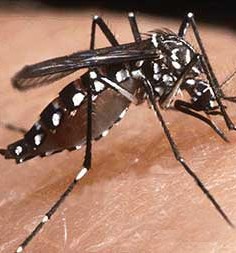Cayman keeps watch on dengue as regional cases rise
 (CNS): Although no new cases of dengue fever have been reported in Cayman since January of this year, public health officials say they are monitoring the regional situation. The fever is rising sharply in the Caribbean and the mosquito which can transmit the disease is present locally. There are no vaccines to prevent the fever and officials say the best prevention is avoiding mosquito bites. Medical Officer of Health Dr. Kiran Kumar said, “Although we had three confirmed cases reported in Januarythis year, there have been no other dengue cases reported since then and the Cayman Islands is still considered to be dengue free. However, especially with the regional outbreak in mind, we are not complacent and medical personnel are on high alert to look for any local cases.”
(CNS): Although no new cases of dengue fever have been reported in Cayman since January of this year, public health officials say they are monitoring the regional situation. The fever is rising sharply in the Caribbean and the mosquito which can transmit the disease is present locally. There are no vaccines to prevent the fever and officials say the best prevention is avoiding mosquito bites. Medical Officer of Health Dr. Kiran Kumar said, “Although we had three confirmed cases reported in Januarythis year, there have been no other dengue cases reported since then and the Cayman Islands is still considered to be dengue free. However, especially with the regional outbreak in mind, we are not complacent and medical personnel are on high alert to look for any local cases.”
Currently dengue outbreaks are reported in a number of Caribbean countries as well as Honduras, Belize, Puerto Rico, and Trinidad and Tobago.
“Dengue fever is caused by a virus, but a mosquito biting a person with dengue fever can spread the virus to another person,” Dr Kumar explained. “Hence persons, who develop symptoms within two to three weeks of having returned from countries with dengue cases, are advised to consult their physician.”
The symptoms of dengue are high fever, severe headache, backache, joint pains, nausea and vomiting, eye pain, and rash. The incubation period (the time that the infection takes to develop before it shows symptoms) is usually four to seven days; but can be up to three weeks.
There is no vaccine or specific medication to treat dengue infection, and people travelling to known dengue endemic countries should take preventative measures such as using a repellent, wearing protective clothing, using air conditioning indoors or only opening screened windows and doors, and staying indoors during early dawn and dusk when mosquitoes are most active.
While there are no local cases of dengue fever, the dengue carrier – the Aedes aegyptii mosquito – is present in the Cayman Islands, making transmission of the disease possible.
“The only real protective measure is avoiding mosquito bites,” Dr. Kumar added.
Upon report of a suspected dengue case the Public Health Department would immediately inform its partners in prevention and control the Mosquito Research and Control Unit (MRCU) and the Department of Environmental Health (DEH) of the suspected case, and they would take measures as if it was a case of dengue fever and enhance their mosquito control measures around the residence of the case.
For more information, call the Public Health Department on 244-2648 or 244-2621, or Faith Hospital on 948-2243. For advice on mosquito control measures contact the MRCU on 949-2557 or DEH on 949-6696 in Grand Cayman or 948-2321 in Cayman Brac.
Countries in region reporting cases of dengue and dengue hemorrhagic fever include Argentina, Bahamas, Barbados, Belize, Bolivia, Brazil, Columbia, Costa Rica, Cuba, Dominican Republic, El Salvador, French Guiana, Guadeloupe, Honduras, Jamaica, Mexico, Peru, Puerto Rico, Trinidad and Tobago, and Venezuela.
Category: Health


hmmm, I wonder who let the cat out of the bag? excuse me, I mean dengue mosquito!
Sorry CNS but it’s here. A friend of mine went to the hospital with a fever and they said Dengue. break out the bug spray everyone!
Perhaps $9 million would help!
It is in South Florida too… 1 Case in Miami currently and been 12 so far this year in Key West.
MRCU needs to step up their spraying especially in West Bay where we are getting bit not only after dark but during the day as well. My son is allergic to some mosquito bites but we cannot control them as in recent weeks we have seen a tremendous increase around our area to the point where we let in a few every time the door opens.
We will hear after the fact that it is here.